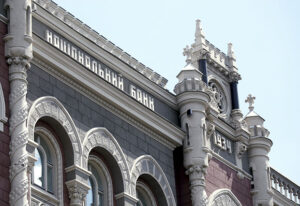
The National Bank of Ukraine has applied influence measures to ALC IC “Varto” and PrJSC “IC “Into” in the form of the obligation to take measures to eliminate violations and the causes that contributed to their commission.
“Measures of influence are applied due to failure to comply with the requirements of paragraphs 1 and 11 of the NBU’s board resolution “On peculiarities of registration procedures and licensing of participants of the non-banking financial services market during martial law …”, the regulator said in a statement on its website.
According to the document, it refers to written assurances of companies to the National Bank on the compliance of direct and ultimate owners of material participation to the requirements of the regulator on the financial / property status, the documents to assess such a position and subsequent responses to the NBU request.
It is clarified that the Committee on the Supervision and Regulation of Non-Banking Financial Services Markets adopted such decisions on May 29, 2023.
According to the NBU, the net earned premiums of IC “Varto” in the first quarter of 2023 amounted to 4,36 mln UAH, insurance payments – 2,57 mln UAH, net profit – near zero. Assets of the company at the beginning of April equaled UAH 39,03 mln, shareholders’ equity – UAH 34,16 mln.
The larger IC “Into” has net earned insurance premiums in the first quarter of 2023 were equal to UAH 17,67 mln, insurance payments – UAH 10,46 mln, net profit – UAH 0,28 mln. At the beginning of April assets of the company amounted to UAH 146,35 mln, shareholders’ equity – UAH 110,63 mln.

The National Bank of Ukraine on May 11 has cancelled all licenses of ALC Insurance Company Speir (Kyiv) to provide financial services.
According to the message on the website of the regulator, an unscheduled inspection carried out by the NBU in February-March this year found a repeated violation of license conditions – the insurer does not comply with mandatory standards.
The countermeasure for similar violations of license conditions to ALC “IC “Speir” was already applied on September 2, 2022.
The decision on revocation of the license shall come into force on May 12, 2023.
As previously reported, the rating agency “Standard-Rating” has withdrawn the credit rating / financial stability rating of the insurer SK “Speir” on February 9, 2023.
By results of H1 2022 ADO IC Speir received UAH 5,5 m of insurance premiums, 95% of which – from natural persons, and carried out UAH 22,8 th of insurance payments. The market share of the company according to the results of H1 2022 – 0,06%.

The National Bank of Ukraine (NBU) on May 8 applied to Kyivska Rus Insurance Company PJSC a sanction in the form of temporary suspension of its license to provide financial services in insurance due to failure to submit reports for the first half of 2022 and for 2022, as well as an actuarial report for 2022.
According to the regulator’s website, the company also failed to submit a report on corporate governance and information on the key risks and the results of stress testing for 2022, and failed to provide information and documents requested by the NBU.
The insurer has been set a deadline for elimination of violations till June 8, 2023.
Private JSC “IC “Kyivska Rus” performs activity in voluntary and obligatory types of insurance, other than life insurance.
According to the accounts of the insurer for nine months of 2022 the amount of insurance payments totaled 85,4 mln UAH of which 76,9 mln UAH were paid out by reinsurers. The insurer made no payments during the above period.

Ukraine’s unemployment rate will decline to an average of 21.1% in 2023 from 21.1% in 2022, the National Bank said in its inflation report, explaining the improvement by revised methodology and positive trends in the labor market.
In its January report, it estimated unemployment in 2022 at 25.8% and expected it to rise slightly to 26.1% this year.
“In the absence of official statistics, assessing the impact of the war on the labor market, both in general and in terms of certain categories of the population and regions, is difficult and requires additional research methods, including the use of alternative sources of information. These are the data and survey results that allowed us to refine the unemployment estimate for 2022,” the NBU said.
He specified that based on such surveys, the average unemployment rate in 2022 is estimated at 19% to 23%. In addition, an improvement in the unemployment rate in the second half of 2022 was confirmed.
“Since the beginning of 2023, the labor market has been gradually recovering, but this process is still unstable… Since the beginning of 2023, the situation on the labor market has been improving. However, unemployment remains high and is becoming structural,” the NBU said.
It is noted that imbalances in the labor market will persist, the unemployment rate will remain higher than before the war, and real wage growth will be more restrained, but uneven by sector and region.
According to the published information, the recovery in the labor market was driven by an improved situation in the energy sector and a seasonal pickup in activity.
The NBU added that the burden per vacancy has increased and differs significantly between regions and professions. This is due to both changes in the structure of the economy as a result of the war and a large number of IDPs, and may indicate increased signs of structural unemployment. One of the reasons for structural unemployment is the difficulty of moving potential employees to a region where there is work in their specialty.
In terms of wages, the SSSU estimates that in 2022, thanks to the public sector, the average nominal wage increased by 5.9% (real wages decreased by 11.8%), which is better than the NBU’s previous estimates.
It is expected that real wages will grow by 3.7% on average in 2023, while nominal wages will grow by 21.9%, while in January the NBU estimated these figures at 3.3% and 25%, respectively.
As reported, the NBU improved its inflation forecast for this year to 14.8% from 18.7% compared to its January report. According to its estimates, inflation in annual terms will decline from 21.3% to 14.5% in the second quarter, after which it will fluctuate between 14.9 and 14.7% by the end of the first quarter of 2024.

The National Bank of Ukraine in accordance with the requirements of the new law “On Payment Services” has included Ukrposhta, NovaPay and six other companies in the payment infrastructure register and issued eight more licenses to provide financial payment services.
According to a statement from the NBU on Friday evening, they also included FC MBK LLC, Diamond Pay, United Space FC, Finexpress FC, Capital Business Group and Payment Center FC.
Such decisions were taken by the Committee on the supervision and regulation of non-banking financial services markets on April 27 and 28, 2023.
The National Bank reminded that the law “On Payment Services” was introduced on August 1, 2022. According to the law, the financial market participants licensed to transfer funds in national currency without opening accounts may apply to the National Bank of Ukraine till April 30, 2023 inclusive, in order to “re-register” their license as required by the law.
According to the NBU, the payment infrastructure register currently includes BOT and 83 other companies and organizations.

The National Bank of Ukraine (NBU) has improved its forecast for the country’s gross domestic product growth in 2023 to 2 percent from 0.3 percent in its January forecast, which is largely due to lower security risks, the restoration of the energy system, as well as soft fiscal policy.
“The economy will return to growth as early as this year and accelerate in the years ahead on the back of the reduced security risks in the forecast. Given the rapid recovery of the energy system, as well as the soft fiscal policy, the forecast of economic growth in 2023 has been improved from 0.3% to 2%,” the NBU said in a press release on Thursday.
It is indicated that the reduction of security risks from next year, which is allowed in the baseline scenario of the NBU forecast, will accelerate economic growth – up to 4.3% in 2024 and 6.4% in 2025.
Besides, de-occupation of territories and full opening of the Black Sea ports will gradually increase industrial production and crops.
The central bank also expects domestic demand to expand due to the return of some forced migrants.
The regulator noted that under the assumptions of the danger situation, no significant power shortages are envisaged in the future, except for local and situational deficits in the second half of the year.
At the same time, an increase in budget expenditures against the background of significant volumes of international financial aid will support economic activity and consumption.